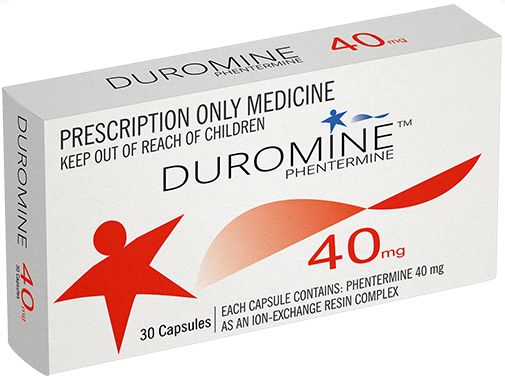Duromine: Uses, How it works, Dosage, Side Effects, Interaction, Reviews

What is Duromine?
Duromine is a brand of phentermine commonly sold in Australia, South Africa, Malaysia, New Zealand, and Singapore among others. Phentermine is a stimulant and is available if you have a prescription. Because taking Duromine comes with a risk of dependence, it is considered a controlled substance in many countries. It’s chemically similar to the stimulant amphetamine.
A healthcare professional may prescribe Duromine if you have obesity, defined by a body mass index (BMI) of 30 or greater. Healthcare professionals may also prescribe it if you have excess weight with a BMI greater than or equal to 27 and have at least one weight-related condition, such as high blood pressure, high cholesterol, or type 2 diabetes. However, a healthcare professional will likely recommend other weight loss strategies first, such as exercise and a calorie-reduced diet.
In Duromine, Phentermine is combined with a resin that slowly releases the phentermine so that the effect of Duromine lasts all day.
How does Duromine work?
Duromine belongs to a class of drugs called anorectics, also known as appetite suppressants. Taking Duromine helps suppress your appetite, thereby limiting how many calories you eat. Over time, this can lead to weight loss.
While the exact way Duromine reduces appetite remains unclear, the drug is thought to act by increasing neurotransmitter levels in your brain. Neurotransmitters — the chemicals norepinephrine, serotonin, and dopamine are — are your body’s chemical messengers. When your levels of these three chemicals increase, your feeling of hunger decreases.
However, you may build a tolerance to the appetite-suppressing effects of Duromine within a few weeks. If that happens, speak with the healthcare professional who prescribed it.

How should I take Duromine?
Take Duromine exactly as prescribed by your doctor. Follow all directions on your prescription label and read all medication guides or instruction sheets. Your doctor may occasionally change your dose.
For adults and children above the age of 12, the recommended starting dose of Duromine is 30 mg daily while the recommended continuous or intermittent maintenance dose is between 15-30 mg daily depending on responsiveness.
Doses are normally taken before breakfast, or 1 to 2 hours after breakfast. Follow your doctor’s dosing instructions very carefully.
Never use Duromine in larger amounts, or for longer than prescribed. Taking more of this medication will not make it more effective and can cause serious, life-threatening side effects.
This medicine is for short-term use only. The effects of appetite suppression may wear off after a few weeks.
Duromine may be habit-forming. Misuse can cause addiction, overdose, or death. Selling or giving away this medicine is against the law.
Call your doctor at once if you think this medicine is not working as well, or if you have not lost at least 4 pounds within 4 weeks.
Do not stop using this medicine suddenly, or you could have unpleasant withdrawal symptoms. Ask your doctor how to safely stop using this medicine.
Store at room temperature away from moisture and heat. Keep the bottle tightly closed when not in use.
What happens if I overdose?
Seek emergency medical attention or call the Poison Help line at 1-800-222-1222. An overdose of phentermine can be fatal.
Duromine overdose symptoms may include confusion, panic, hallucinations, extreme restlessness, nausea, vomiting, diarrhea, stomach cramps, feeling tired or depressed, irregular heartbeats, weak pulse, seizure, or slow breathing (breathing may stop).
Can a pregnant or breastfeeding woman take Duromine?
Duromine and other appetite suppressants are typically not recommended during pregnancy because most women shouldn’t lose weight while they’re pregnant. If you took Duromine before pregnancy or before you knew you were pregnant, you may have concerns about its effects on your developing baby. Duromine should also be avoided in lactating women and you should consult with your doctor for alternative and suitable solutions if any.
Duromine side effects
Duromine doesn’t cause drowsiness, but it can cause trouble sleeping. It can also cause other side effects.
More common side effects
The more common side effects of Duromine can include:
- bad taste in your mouth
- constipation
- diarrhea
- dry mouth
- headache
- vomiting
If these effects are mild, they may go away within a few days or a couple of weeks. If they’re more severe or don’t go away, talk to your doctor or pharmacist.
Serious side effects
Call your doctor right away if you have serious side effects. Call 911 if your symptoms feel life-threatening or if you think you’re having a medical emergency. Serious side effects and their symptoms can include the following:
- Primary pulmonary hypertension (PPH). This is a type of high blood pressure that affects the arteries in your lungs and the right side of your heart. Symptoms can include:
o shortness of breath
o heart palpitations (fast, fluttering heartbeat)
o dizziness
o cyanosis (bluish color to your lips and skin)
o tiredness
o edema (swelling of your legs and ankles)
o angina (chest pain)
- Valvular heart disease. This drug may harm your heart valves so they can’t close properly and may leak. Symptoms can include:
o fatigue and weakness, especially when you increase your activity level
o shortness of breath during activity or when you lie down
o edema (swelling of your legs and ankles)
o angina (chest pain), chest discomfort or tightness that often gets worse during exercise
o lightheadedness or fainting
o arrhythmia (irregular heartbeat)
o heart murmur
o heart palpitations (fast, fluttering heartbeat)
- Hypertension (high blood pressure)
- Restlessness
- Tremors (uncontrollable rhythmic movement in one part of your body)
- Insomnia (trouble sleeping)
- Erectile dysfunction in men (trouble getting or keeping an erection)
Duromine may cause other side effects. Call your doctor if you have any unusual problems during your treatment with Duromine. If you experience a serious side effect, you or your doctor may send a report to the Food and Drug Administration’s (FDA) MedWatch Adverse Event Reporting program online (http://www.fda.gov/Safety/MedWatch) or by phone (1-800-332-1088).
Is there any condition where the Duromine is contraindicated?
Duromine is contraindicated in the following medical conditions:
- disease-related to blood vessels in the brain.
- glaucoma (high pressure in the eye).
- high blood pressure in the lung.
- narrowing of the blood vessels due to thickening or hardening of the blood vessel wall.
- overactive thyroid gland.
- problems with the valves in your heart.
- psychiatric illness including anorexia nervosa (loss of appetite) and depression.
- severe heart disease including changes in the rhythm or rate of the heartbeat.
- very high blood pressure.
What other drugs will affect Duromine?
Taking Duromine together with other diet medications such as fenfluramine (Phen-Fen) or dexfenfluramine (Redux) can cause a rare fatal lung disorder called pulmonary hypertension. Do not take Duromine with any other diet medications without your doctor’s advice.
Do not use this medicine if you have used an MAO inhibitor in the past 14 days, such as isocarboxazid, linezolid, methylene blue injection, phenelzine, rasagiline, selegiline, or tranylcypromine. A dangerous drug interaction could occur.
Many drugs can affect Duromine. This includes prescription and over-the-counter medicines, vitamins, and herbal products. Not all possible interactions are listed here. Tell your doctor about all your current medicines and any medicine you start or stop using.
Can I buy Duromine online?
It is illegal to buy Duromine online in the United States, Australia, South Africa, Malaysia, New Zealand, and Singapore without a doctor’s prescription because, in these countries, Duromine is either a prescription-only medicine or a controlled substance.





